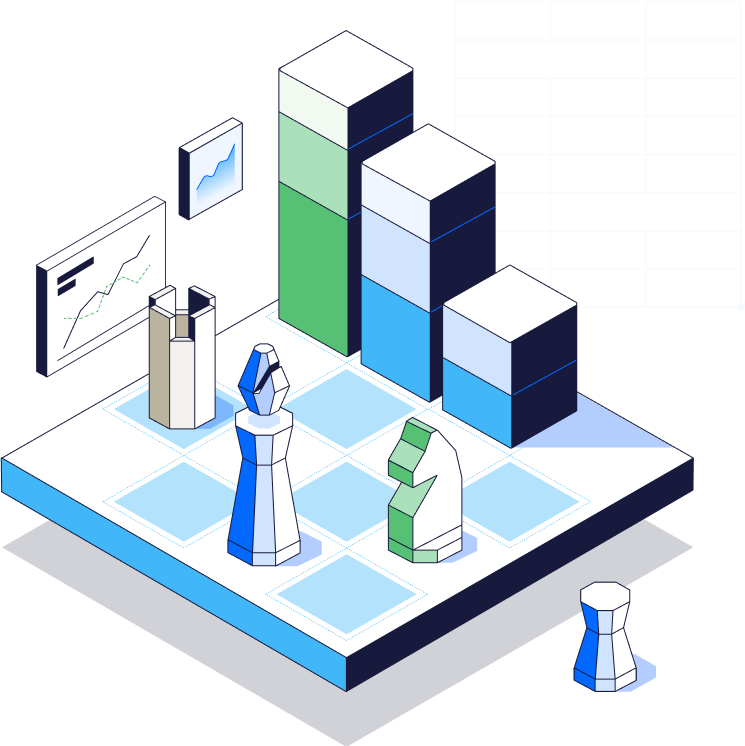The Decline of ERP and the Future of Strategic Finance

Joe Garafalo
Founder and COO
When ERP adoption came into vogue, the original intent was to meet the need for unification amongst a growing set of business tools. Companies saw the need for shared data, and the need to have instant access to a holistic view of each customer—as well as a view into each department in the business, and of course a view of the business as a whole.
Enter the era of ERP technologies. Salespeople promised businesses far and wide, all they needed to do was buy a single platform—and the tool would do everything under one roof. The ERP would be your accounting tool, payment processing tool, human resource tool, expense system, and on and on—all in one shiny package.
But as SaaS began to eat everything in the following three decades (and with the onset of a digital financial transformation), ERPs began to unravel. Sure, they offered a human resource tool. But they didn’t offer the best HR tool on the market, in fact their offerings often felt rigid and limited. Maybe they had great accounting tools, but their payroll system wasn’t flexible. Or they had great expense management tools, but they offered no payment solution. As SaaS tools exploded, businesses now had the option to choose the very best version of the tools they needed, even if they lived outside the ERP ecosystem. And as businesses realized ERPs didn’t have the very best version of each tool the product suite supposedly represented, they began to look elsewhere. Finding better pricing and better quality tools that were designed for specific jobs.
That all-in-one package didn’t look so shiny anymore. And by acquiring more tools outside that centralized ERP product suite, businesses watched their toolset that was already broken down, break down even further. Because sadly, a system that’s designed to do everything well—ends up doing nothing well.
Three Decades of Broken ERP Promises (and Where They Lead Us)
On the way down, it’s become clear that ERPs have broken many of their promises, leaving finance teams broken in their wake. It’s led many to think—maybe ERPs don’t belong at the center of your team’s technology. While the ERP will always have a place in any finance team’s tech stack, those broken promises still deserve a solution. And to understand that solution we need to strive toward, it’s essential to identify where past tools have failed us, so we can focus on meeting those failures head on with new technology aimed to better support future finance initiatives and fast-growing businesses.
ERPs Promised to Be Your Single Source of Truth
The idea was that if everything lived under the same roof, then every tool could talk to every other one. You’d finally have a unified look at your data throughout each category in your business. Finally, a single source of truth. The golden goose. But the use of tools outside the ERP—ensured that the golden goose never laid a single egg. Sure, ERPs can spit out some high-level aggregate numbers from data sets across your different systems—but how usable is that data for your team on a daily or weekly basis? How deep can you dive? Does it help you understand and strategize for the future? If your ERP isn’t providing the kind of actionable data that leads your team in powerful analysis and planning—how much truth is it really providing?
ERPs Promised to Be Up To Date
Data standardization is undoubtedly a monster. With more data being produced than ever before across your growing suite of products, it takes longer and is harder to move, query, and sync data. Most ERP finance solutions are seen as first generation dinosaurs in the software world. Having originated 20 years ago, and doing little to keep up the pace, they simply don’t have the speed of today’s best-in-breed cloud-based software platforms. Add on a tool or two outside the ERP suite, and syncing your data often requires expensive middleware and engineering resources. As automated as ERPs promised to be with whatever data transfer they can accomplish, many processes still require manual button presses to push that data from point A to point B—which meant just as soon as it was synced, it was sadly out of date.
ERPs Promised to Make Life Easier
With all your tools in one place, supposedly living in peace and harmony, united under one magnificent umbrella, daily life was supposed to be easier. One place to login. One set of user management rules. One bill to pay. But the specialized complexity and the bloated code weight of these overdeveloped, under sophisticated tools made it more difficult to view useful data than ever before. And that meant it was doubly difficult to actually understand it. That made finance teams’ lives harder, but it made everyone else in the business’s lives harder too.
Finance Teams Deserve A Better Nucleus for Their Tech Stack
So, with the all of that’s lacking with an ERP, is there a clear path forward for the future of finance and forward-thinking teams? At Mosaic, we understand the need for a centralized location where data can live, pass freely, and unite sources from a variety of tools to paint a more holistic picture of your business. If you are going to have a central sun that your technological “planets” revolve around—and it’s not going to be an ERP, for all the reasons stated above—we’re passionate that it should (and shouldn’t) be a handful of things.
It should be future-facing.
A backward looking system of record that is consistently days, weeks, or even months behind is just not good enough—you need binoculars that help you see into your company’s financial future. Of course you need to see what happened last month and last quarter, but you should also have tools in your toolbox that are focusing your team on next month and next quarter too. An ERP simply does its best to join together what’s already happened. We believe you need better insights into what’s going to happen, to strategically steer your business.
It should be a unifying force.
You don’t need data distributed amongst a set of tools, with different numbers in different places, siloed by team—you need a unified dataset you can check in on, in one place; the same place, any time, like in Mosaic’s new Metric Builder. That unified nature shouldn’t only be in reference to your data though. It should unify your business leaders around shared language. We believe you need to have shared data to make shared decisions. Shared decisions unify companies, allowing you to move quicker—together.
It should enable your team strategically.
You don’t just need a system of cataloging and documenting data—you need a platform that helps you strategize. These nucleus-level tools shouldn’t just be calculators, glorified spreadsheets, or bigger data warehouses. They should be predictive machines that steer the direction of your finance team and enable business leaders across the company. Solid data and forward-thinking let you strategize with complete and total confidence.
It should be simple.
You don’t need an overdeveloped, bloated, complex toolset sitting in the center of your business—you need a simple platform that breaks down barriers, delivers useful data to EVERY function, without complication or frustration. Complexity creates barriers, barriers create drag, and drag kills businesses.
The Future Is Here. The Future Is Mosaic.
Mosaic has recognized the downfall and failures of the ERP for years now, and we’ve decided to do something about it. We’re not content to settle for decades old problems due to antiquated technology that doesn’t solve them. And we’re of the mind that finance teams around the world shouldn’t have to settle either. We’re not saying we’re here to replace your ERP altogether. As a centralized accounting system of record keeping, it still serves a purpose in the finance team’s tech stack. But we are saying we’ve built technology that actually pays off the promises that ERP tools themselves simply were never able to.
As a finance team in today’s world, you deal with mountains of data from every corner of your business. That data, unconnected, is chaotic. Your ERP may be able to bring some order to that chaos—but it certainly doesn’t help you understand that data better than you did before it was centralized. That’s where Mosaic comes in.
Strategic Finance isn’t just about stashing data in one place. It’s about using the data you have, from wherever you need it to come from, to help you see into the future. To drive meaning and understanding from the data you have. To help you make the smartest decisions possible for your company. To make your daily lives easier. So let us be your new nucleus. We can’t promise the world. But we can promise to be your sun. Your ERP is no longer at the center of your tech stack. Welcome to the future. Welcome to Mosaic.
Own the of your business.
